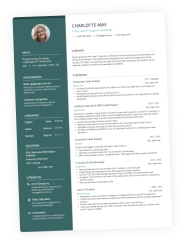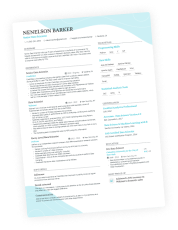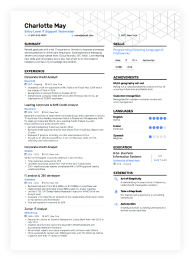Hiring managers today receive hundreds of applications for every job position they have open, which makes it impossible for them to read them all.
On average, they spend 7 seconds on each one before they decide whether they want to keep on reading, or discard it.
That’s why it is essential to sell yourself, and do it well and fast.
But that’s easier said than done.
How exactly are you supposed to sell yourself through your CV, and do it well enough in these 7 seconds, so that you will keep the hiring manager’s attention.
We got you covered, in this article we are going to find out:
- How to sell yourself on a CV?
- How NOT to sell yourself on a CV?
And if you are going to do it, you’d better do it right. Try out our CV Builder and create a unique and attention-grabbing design in no time.
But first, let’s see all the crucial dos and don'ts for selling yourself on a CV.
How to sell yourself on a CV?
Upload & Check Your CV
Drop your CV here or choose a file. PDF & DOCX only. Max 2MB file size.
If you want to sell yourself on a CV, a good design is a great start, but it won’t get you the job. Let’s dig a little deeper.
Make a good first impression
The top part of your CV is usually the turning point for most hiring managers, and that’s where they will decide whether they would like to keep on reading, or not.
In that part of your CV, you should have:
Your header should include your full name and contact information.
Make sure your name is written in a larger font than anything else on your CV, as that’s what you are selling, don’t let the hiring manager forget that.
When it comes to the contact information, you absolutely must include two things:
- Phone number – make sure you provide one that is always on you, so that you would be able to answer a potential call from a hiring manager
- Email address – it should be professional, the best way to go is use an email provider like Gmail, and stick to a format that includes your names, like “ firstname.lastname@gmail.com “
A great addition to your contact information can be:
- An address – it is not mandatory, but you should include it, if the job listing requires it. Make sure you stick to just state and city, anything more than that is not needed
- LinkedIn profile – that’s a great addition to your CV, as it can show the hiring manager some more additional information later on. If you don’t have one, you should consider creating it
- Personal website or portfolio – that only applies to some job positions, and you should only include it if it is relevant, and you have something to show with it
As for the CV summary, that’s the place you need to summarize everything you want to present to the hiring manager with your application.
It should have your greatest accomplishments, as well as expertise and skill set.
An important thing to be extra careful about here is not to make it too long. It is a lot of information, but more than 2-3 sentences is already too much.
Focus on achievements, rather than responsibilities
Gone are the days when employers wanted to see your responsibilities under each entry in your work experience section.
That’s because for many roles, these specifics are too similar, and they don’t get any valuable information.
Instead of responsibilities, you should focus on your achievements in all your work experience entries.
That’s what can really grab the hiring manager’s attention and make them consider you as a great candidate.
Use hard numbers and specific details
Achievements alone are great, but you need to back them up with some proof, or even better – some hard numbers.
Every achievement you would like to list on your CV can be measured by some metrics, and you need to show off your results using them.
And by using some kind of metrics, you can show the hiring manager that what you listed is no longer just your opinion, but there is some real proof behind it.
To do this right, it’s a good idea to start keeping notes on your performance and achievements at work.
Furthermore, you can list any other kind of specifics that would prove your achievements worthy, like:
- Awards
- Nominations
- Special recognition you have received
- Any positive feedback from colleagues or customers
Use all the right keywords
One thing you should never miss out on doing when selling yourself on a CV is including keywords related to the job position you are applying for.
The best way to get all the right keywords is by scanning the job description for any important ones that the hiring manager would be looking for in your CV.
Make sure you are not paraphrasing them, though, you need to use the exact same language, used in the job listing. That’s because of two important reasons:
- The company may be using an Applicant Tracking System (ATS) that would scan for keywords set by your potential employer. That software would be looking for exact matches with the keywords in the job listing, and if you paraphrase them, you will likely be dismissed
- Even if the company is not looking for an ATS, the hiring manager would initially be looking for the keywords from the job listing. As they receive tons of CVs on a daily basis, there is a great chance that they would also ignore any paraphrases, and would be looking for exact matches
How NOT to sell yourself on a CV?
Now you know what to do when you are selling yourself on your CV. But don’t rush into sending it out just yet. Take the time and find out what you should not do.
Don’t brag
Bragging statements can’t do you any good.
If you include anything impressive on your CV, you should be able to back it up with some examples and metrics, or it will be perceived in a wrong way.
And one last thing, make sure you are comfortable with what you are writing in your CV. If you are not comfortable to say it out loud during an interview, you should keep it out of your CV.
Don’t lie or exaggerate
If you really want to get a certain job, you might be tempted to exaggerate, or even lie.
But that never works out well.
You will most likely be caught by the hiring manager at some point in the hiring process, and you will be immediately dismissed.
But even if you manage to get the job, you will most likely get in trouble later on in the work process, which can only hurt your career in the long term.
If you lack something for a particular job position, lying is not the right way to go. Instead, you can show the hiring manager how you can transfer your previous experience to the new job.
Don’t try to be perfect
You are not perfect, and nobody expects you to be, certainly not the hiring manager.
And trying to prove that you are, you can only come across as arrogant.
Instead, you should focus on presenting your strengths and weaknesses, as well as that you have room to grow, and you are enthusiastic to learn new things.
Takeaways
We are all done, now you know how to sell yourself on a CV, and do it right.
Let’s just go really quick through all the things you need to do:
- Start strong with your header and summary, and make a great first impression with the hiring manager
- You should focus on your achievements, that’s what really interests hiring managers. Responsibilities for job positions are no longer grabbing their interests.
- When listing your achievements, make sure you can provide some real proof with either hard numbers, or specific details
- You should scan the job listing for any important keywords that the hiring manager would be looking for, as that may be the difference between getting the job and being dismissed
And let’s not forget about what you should avoid when selling yourself on your CV:
- Don’t brag with anything that you can’t provide any proof behind it
- Don’t exaggerate or lie, that can only hurt your chances, or your long term career
- Don’t try to be perfect, nobody expects you to be, hiring managers like real people
Now start selling yourself to hiring managers, and get the job that you deserve.



